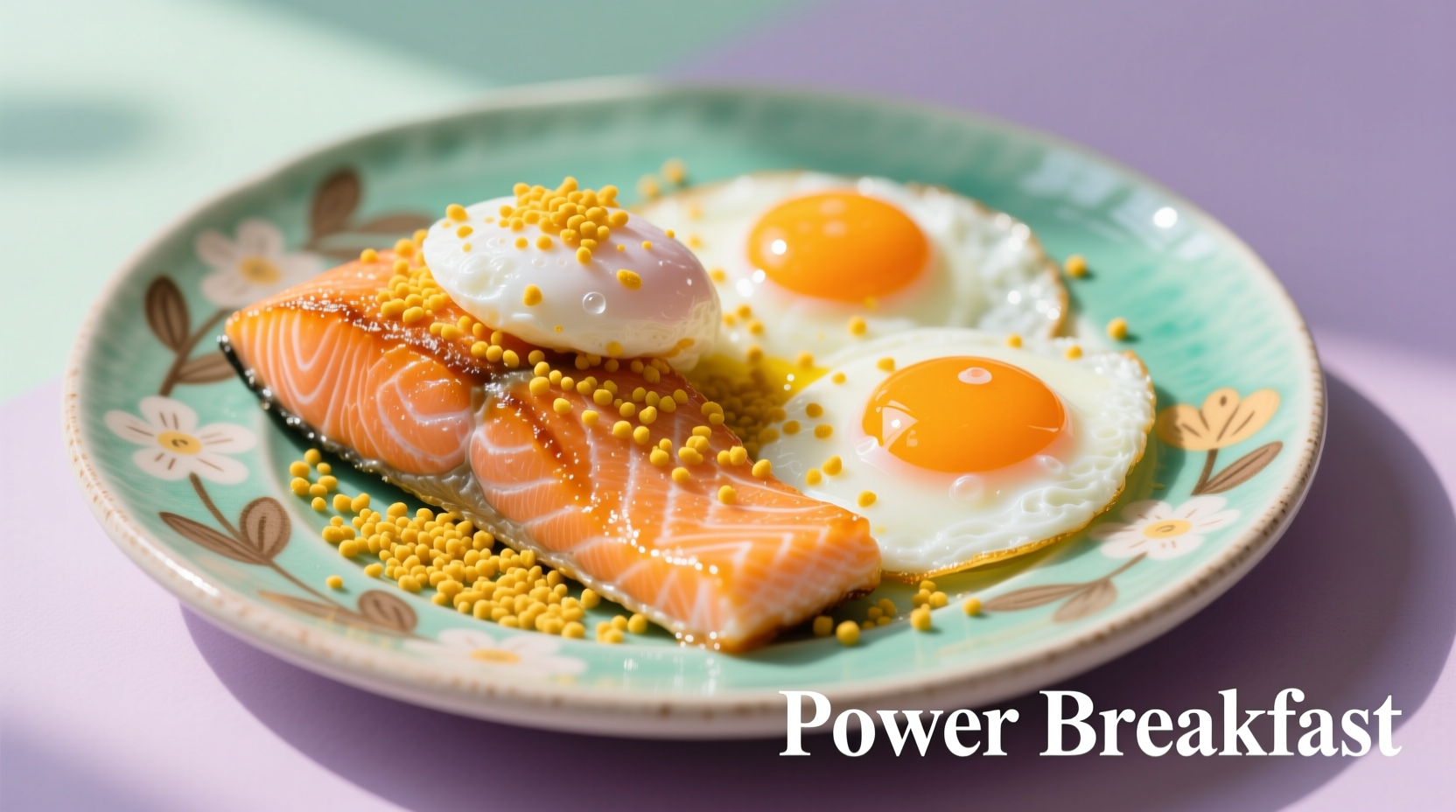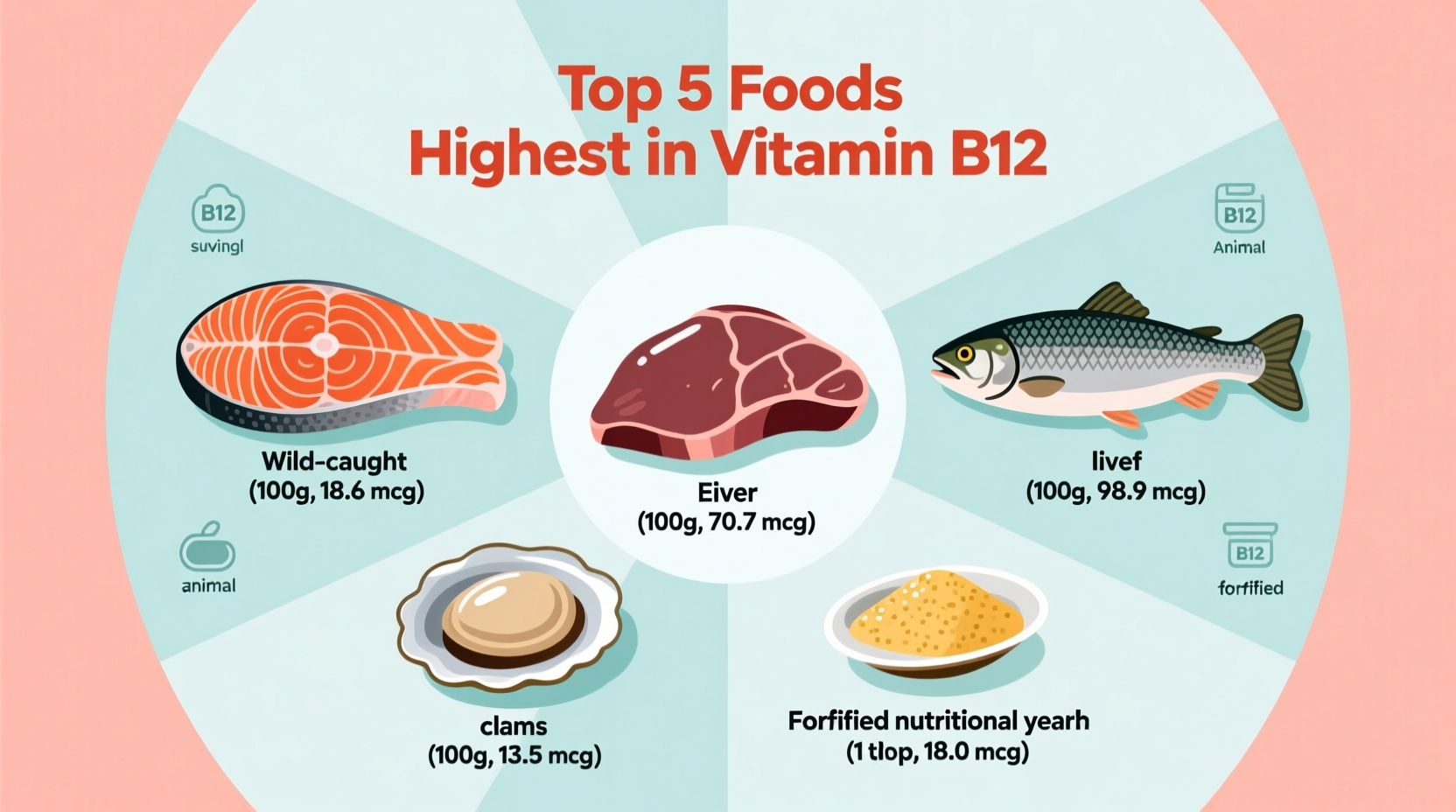Discover exactly which foods deliver the most vitamin B12 per serving, how much you actually need, and what factors affect your body's ability to absorb this crucial nutrient. This guide cuts through the confusion with verified data from nutritional science, helping you make informed dietary choices whether you're omnivorous, vegetarian, or vegan.
Why Vitamin B12 Matters More Than You Think
Vitamin B12 (cobalamin) plays a critical role in red blood cell formation, neurological function, and DNA synthesis. Unlike other vitamins, your body can't produce B12—it must come from dietary sources. The National Institutes of Health recommends 2.4 mcg daily for adults, but absorption rates vary dramatically based on food source and individual physiology.
Deficiency affects 15-40% of adults over 60 according to NIH research, with symptoms including fatigue, memory problems, and nerve damage. Vegetarians and vegans face higher risks since natural B12 exists almost exclusively in animal products.
Top 10 Foods Ranked by B12 Content
| Food Source | Per Serving | B12 (mcg) | % Daily Value |
|---|---|---|---|
| Clams (cooked) | 3 ounces | 84.1 | 3,504% |
| Beef liver (cooked) | 3 ounces | 70.7 | 2,946% |
| Rainbow trout (wild) | 3 ounces | 5.4 | 225% |
| Sockeye salmon | 3 ounces | 4.8 | 200% |
| Tuna (light, canned) | 3 ounces | 2.5 | 104% |
| Fortified nutritional yeast | 2 tablespoons | 2.4-8.0 | 100-330% |
| Beef (lean ground) | 3 ounces | 1.5 | 63% |
| Low-fat milk | 1 cup | 1.2 | 50% |
| Swiss cheese | 1 ounce | 0.9 | 38% |
| Eggs (whole) | 1 large | 0.6 | 25% |
Data sourced from USDA FoodData Central (2023 database). Note that fortified foods like plant milks and cereals vary significantly by brand—always check nutrition labels.
Understanding B12 Absorption: What the Numbers Don't Tell You
The listed B12 values represent total content, but your body absorbs only a fraction. According to American Journal of Clinical Nutrition research, healthy adults absorb about 1.5-2 mcg per meal through intrinsic factor-mediated absorption, with additional passive diffusion of smaller amounts.
This explains why clams' massive 84.1 mcg serving doesn't translate to 3,500% utilization. For practical purposes, regularly consuming 2-3 servings of moderate-B12 foods (like salmon or eggs) provides more consistent benefits than occasional high-dose animal liver consumption.

Dietary Considerations for Different Lifestyles
For Omnivores
Incorporate fatty fish like salmon twice weekly—this delivers substantial B12 while providing omega-3s. One 3-ounce serving covers your entire weekly requirement. Organ meats like liver offer extreme concentrations but should be consumed sparingly (once monthly) due to excessive vitamin A content.
For Vegetarians
Dairy and eggs provide moderate B12, but you'll need strategic planning. Two large eggs plus 1 cup of milk delivers 45% of your daily needs. Consider adding fortified nutritional yeast to dishes—it provides complete protein along with B12 and has a naturally cheesy flavor.
For Vegans
Natural plant sources of B12 are unreliable. Your only practical options are:
- Fortified nutritional yeast (check labels for cyanocobalamin)
- B12-fortified plant milks (almond, soy, oat)
- Breakfast cereals with added B12
- Supplements (methylcobalamin preferred)
Research from The Vegetarian Resource Group shows consistent fortified food consumption prevents deficiency in 98% of cases when following recommended serving sizes.
Practical Incorporation Strategies
Maximize your B12 intake with these chef-tested techniques:
- Add nutritional yeast to popcorn, pasta, or roasted vegetables for a cheesy flavor boost
- Include canned salmon in salads or sandwiches for quick B12-rich meals
- Prepare a weekly frittata with eggs, spinach, and feta cheese
- Choose fortified plant milks when making smoothies
- Snack on Greek yogurt with berries for a B12 and protein boost
Remember that cooking methods affect nutrient retention. Baking or poaching fish preserves more B12 than frying. For fortified foods, check expiration dates—B12 degrades over time, especially when exposed to light.
When Food Isn't Enough: Supplementation Guidance
Certain populations may require supplements regardless of diet:
- Adults over 50 (reduced stomach acid impairs absorption)
- Those with gastrointestinal disorders (Crohn's, celiac)
- Post-bariatric surgery patients
- Long-term metformin users
The American College of Physicians recommends 250-500 mcg daily supplements for at-risk groups. Sublingual forms show no absorption advantage over oral tablets according to American Family Physician studies.
Frequently Asked Questions
Can you get enough B12 from plant-based foods without supplements?
Naturally occurring plant sources of bioactive B12 are unreliable. Tempeh, spirulina, and seaweed contain B12 analogs that may actually interfere with true B12 absorption. Your only reliable plant-based options are fortified nutritional yeast, plant milks, and breakfast cereals—always verify the label shows added cyanocobalamin or methylcobalamin.
How much B12 does fortified nutritional yeast typically contain?
Fortified nutritional yeast generally provides 2.4-8.0 mcg per 2-tablespoon serving, covering 100-330% of daily needs. Brands like Bragg and Bob's Red Mill fortify with cyanocobalamin. Always check the nutrition facts panel as concentrations vary significantly between products.
Does cooking destroy vitamin B12 in foods?
B12 is relatively heat-stable compared to other vitamins. Baking or poaching preserves over 90% of B12 content, while frying at high temperatures may reduce levels by 10-20%. Water-soluble nutrients leach into cooking liquid, so using fish poaching liquid in sauces helps retain B12. Avoid prolonged high-heat cooking methods for maximum retention.
How often should I eat B12-rich foods to maintain healthy levels?
For omnivores: Consuming B12-rich foods 3-4 times weekly maintains healthy levels. Vegetarians should include dairy/eggs daily. Vegans require daily fortified food consumption or supplements. Blood tests every 6-12 months are recommended for at-risk populations to verify adequate levels, as deficiency can develop insidiously over years.











 浙公网安备
33010002000092号
浙公网安备
33010002000092号 浙B2-20120091-4
浙B2-20120091-4